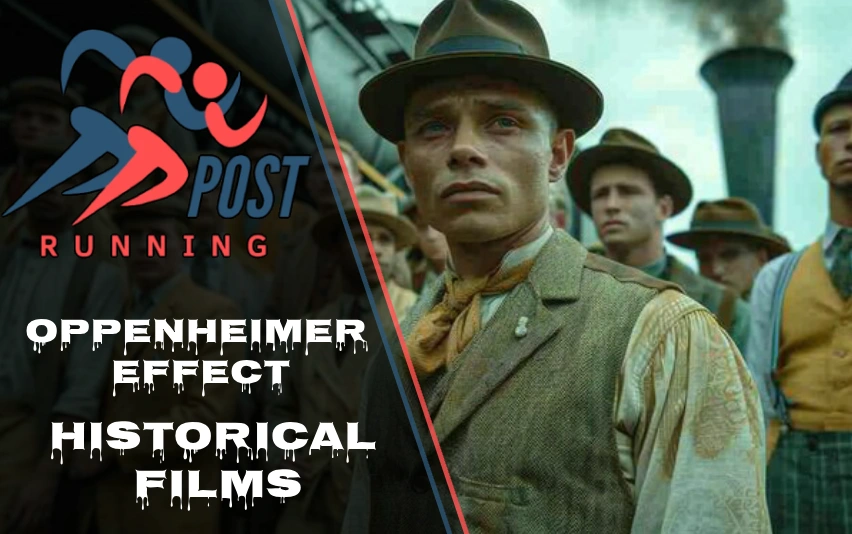The “Oppenheimer Effect on Historical Films” has become a game-changer in the world of cinema. Christopher Nolan’s 2023 film “Oppenheimer” didn’t just make waves; it created a tsunami in the historical film genre. This effect goes beyond mere box office success, influencing how filmmakers approach historical accuracy and shaping public perception of significant events.
“Oppenheimer” isn’t just another movie about World War II. It’s a cinematic powerhouse that’s redefined how we look at history on the big screen. The film raked in nearly a billion dollars worldwide and snagged several Oscars, including Best Picture, Best Director, and Best Actor. But its impact goes far deeper than awards and ticket sales.
Historical Accuracy Reimagined
Nolan’s commitment to historical accuracy in “Oppenheimer” set a new standard for the genre. He didn’t just skim the surface; he dove deep into the archives. The film draws heavily from declassified documents and historical records, bringing a level of authenticity that’s rare in Hollywood.
But Nolan didn’t stop there. He took his crew to actual historic locations, breathing life into the settings where these world-changing events unfolded. To ensure he got the details right, Nolan consulted with historians and biographers who specialize in Oppenheimer’s life and the Manhattan Project.
Walking the Tightrope: Fact and Fiction
Creating a compelling historical film isn’t just about getting the facts right. It’s about finding the sweet spot between accuracy and storytelling. Nolan masterfully incorporated fictional elements to amp up the drama without straying too far from the truth.
One of the biggest challenges was portraying complex historical figures like J. Robert Oppenheimer. These weren’t simple heroes or villains, but multifaceted individuals grappling with enormous moral dilemmas. Nolan used innovative visual techniques to distinguish between objective historical events and subjective perspectives, giving viewers a nuanced understanding of the story.
Shaking Up the Historical Film Genre
“Oppenheimer” didn’t just raise the bar for historical films; it completely changed the game. The film sparked a renewed interest in historical subjects, particularly those related to science and technology. Suddenly, topics that might have seemed dry or technical became the stuff of blockbuster entertainment.
This shift has influenced how filmmakers approach morally ambiguous historical figures. No longer are historical characters painted in black and white; “Oppenheimer” showed that it’s possible to explore the gray areas of human nature while still creating compelling cinema.
Engaging the Public with History
One of the most significant aspects of the “Oppenheimer Effect” is how it’s engaged the public with history. The film didn’t just entertain; it educated and sparked conversations about nuclear ethics and the consequences of scientific advancement.
“Oppenheimer” brought the Manhattan Project into the spotlight, increasing public awareness of this pivotal moment in history. It’s made people curious about the real Oppenheimer, leading them to compare the film’s portrayal with earlier depictions in media.
Cinematic Techniques: A New Language for History
Nolan’s use of cinematic techniques in “Oppenheimer” has set a new standard for historical storytelling. The interplay of color and black-and-white footage isn’t just a stylistic choice; it’s a way of distinguishing between different perspectives and timelines.
The film also broke new ground in how it incorporated scientific concepts into its visual storytelling. Complex physics theories became accessible through clever cinematography and special effects. This approach struck a delicate balance between personal narratives and the broader historical context.
The Challenge of Historical Figures
Portraying historical figures is always a tightrope walk, and “Oppenheimer” tackled this challenge head-on. The film didn’t shy away from the controversial aspects of Oppenheimer’s life, including his political affiliations and the moral quandaries he faced.
Nolan’s approach to balancing historical accuracy with compelling storytelling has become a blueprint for future historical films. He showed that it’s possible to respect the facts while still creating a gripping narrative.
From Concept to Oscar Gold: The “Oppenheimer” Timeline
- September 2021: Nolan announces “Oppenheimer,” setting the film world abuzz.
- February-May 2022: Principal photography takes place, with Nolan’s trademark attention to detail.
- July 2023: “Oppenheimer” hits theaters, becoming an instant critical and commercial success.
- March 2024: The film sweeps the Oscars, including the coveted Best Picture award.
The Lasting Impact
The “Oppenheimer Effect on Historical Films” isn’t just a fleeting trend. It’s a seismic shift in how we approach historical storytelling in cinema. Nolan’s film has shown that historical accuracy and compelling storytelling aren’t mutually exclusive. It’s raised the bar for what audiences expect from historical films and what filmmakers believe is possible within the genre.
Moreover, “Oppenheimer” has demonstrated the power of cinema to engage the public with complex historical events. It’s not just entertainment; it’s a catalyst for learning and discussion about pivotal moments in our shared history.
As we look to the future of historical cinema, the “Oppenheimer Effect” will undoubtedly continue to influence filmmakers and audiences alike. It’s opened up new possibilities for exploring the past on screen, challenging us to look at history with fresh eyes and a deeper understanding.
In the end, the “Oppenheimer Effect on Historical Films” isn’t just about one movie. It’s about redefining what’s possible when art meets history on the silver screen. And that’s a legacy that will endure long after the credits roll.
Discover more fascinating insights—explore Running Posts today.















